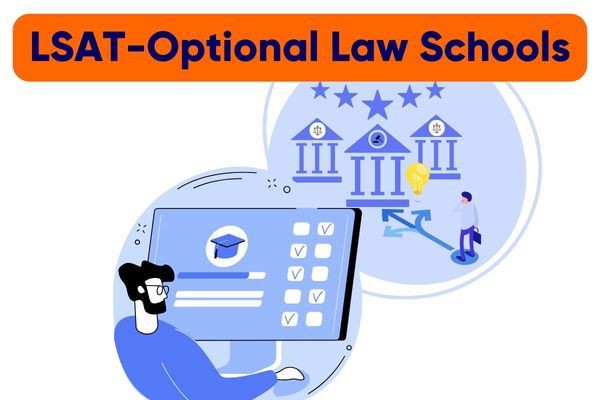LSAT optional law schools are leading the charge in changing the landscape of the legal profession. These days even the easiest law schools to get into and online law schools can have unrealistic LSAT cut-offs. So what can you do to get into LSAT optional law schools and are they really easier to get into than the ones that do require the LSAT? Find out in our article.
Want us to help you? Applicants and students, book a free strategy call here. Universities, businesses, or student organizations representative, book a free call here.
Top 10 LSAT-Optional Law Schools
The LSAT-optional law schools we list below allow you to forego submitting your LSAT score, but some of them do ask for GRE scores instead. Please read research and confirm law school requirements of each school carefully to make sure you apply to the right schools!
University of Arizona James E. Rogers College of Law
University of Chicago Law School
University of Pennsylvania Carey Law School
University of Texas at Austin School of Law
Georgetown University Law Center
Wake Forest University School of Law
Boston University School of Law
George Washington University Law School
What Are LSAT-Optional Law Schools?
You may have come across the term "LSAT-optional" law schools. How does this policy affect law school acceptance rates? As you navigate your journey into the legal field, understanding what “LSAT-optional” means can open up new avenues for you to showcase your strengths.
LSAT-optional law schools are institutions that offer you the choice to submit alternative credentials in place of the traditional LSAT score ranges. This doesn't necessarily mean you can forgo a standardized test altogether, but rather that you have options. Many LSAT-optional schools accept the Graduate Record Examination (GRE) as a substitute, allowing applicants who may have already taken the GRE for other graduate programs to apply without needing to sit for the LSAT.
Take, for instance, Columbia Law School. While they haven't abandoned the LSAT, they've joined the ranks of schools accepting the GRE as an alternative. This move acknowledges the value of diverse academic disciplines that contribute to a well-rounded legal education. If you've excelled in the GRE, especially in the analytical writing section, Columbia Law allows you to leverage that success in your application.
Moving to the Midwest, University of Illinois College of Law also embraces the GRE. They recognize the test's ability to measure a wide range of skills and knowledge that can be beneficial in law school. For you, this means if your strengths lie more in quantitative reasoning or in the diverse skill set evaluated by the GRE, Illinois Law is open to recognizing your potential beyond traditional LSAT measures.
On the West Coast, University of California, Los Angeles (UCLA) School of Law allows applicants to submit GRE scores in place of the LSAT. They understand that excellence comes in many forms and that the GRE can be a more practical option for students who may also be considering graduate programs in other fields.
If you're eyeing a career in corporate law, consider Northwestern University Pritzker School of Law. Known for valuing work experience in its admissions process, Northwestern's acceptance of the GRE aligns with its focus on diverse professional backgrounds and practical skills that contribute to a dynamic learning environment and a robust legal practice.
It's essential to understand that LSAT-optional law schools are not easier to get into. Law school is hard! Even at LSAT-optional schools have really demanding requirements including GPA, experience, communication skills, and more. Your undergraduate GPA, letters of recommendation, and personal essays must collectively paint a picture of you as a candidate with the acumen, drive, and depth suitable for the rigors of law school.
Moreover, this trend towards LSAT-optional admissions doesn't mean the LSAT has become irrelevant. For many, the LSAT is still a critical piece of the application puzzle, a test specifically designed to assess skills pertinent to legal studies. However, for you, the applicant, these LSAT-optional policies could mean that there's more than one way to demonstrate your readiness for the challenges of law school.
Why Are Law Schools Going LSAT-Optional?
As you consider the landscape of legal education, you might notice a significant shift: more and more law schools across the United States are moving toward LSAT-optional policies. This shift reflects a broader trend in higher education towards holistic admissions processes that consider a wider array of factors beyond standardized test scores.
So, why this change? One driving factor is the desire to diversify the applicant pool. Standardized tests like the LSAT can sometimes be barriers to entry for capable candidates who may not test well under traditional conditions or cannot afford extensive preparation courses. For example, Harvard Law School, which went LSAT-optional in recent years, cited the potential for a more diverse applicant pool as one of the reasons for their policy change. They now accept the GRE in addition to the LSAT, with the understanding that the GRE is more accessible to a broader range of applicants, including those with STEM backgrounds.
Furthermore, schools are recognizing that attributes like resilience, communication skills, and ethical judgment are just as important for legal practice as the analytical skills tested by the LSAT. By considering other aspects of a candidate's application, such as the law school personal statement or resumes, schools aim to admit students who will not only excel academically but will also contribute meaningfully to the legal profession.
The impact of LSAT-optional policies on law school demographics is noteworthy. According to a report by the AccessLex Institute, law schools that have adopted a more holistic review process have seen an increase in the enrollment of students from underrepresented groups. This aligns with studies showing that a broader admissions approach can lead to more diverse educational environments.
Take Georgetown University Law Center, for instance, which also accepts the GRE. They've noted that this option opens doors for those who may already be in the workforce or are pursuing other graduate degrees, thus enriching the law school experience with a multitude of perspectives.
But it's not just about diversity in background; it's also about diversity in thought. Northwestern University Pritzker School of Law, another institution that has adopted LSAT-optional policies, emphasizes the value of different viewpoints in fostering a dynamic legal education.
However, it's important to consider that LSAT-optional doesn't mean LSAT-irrelevant. The LSAT still plays a critical role in many schools' admissions processes. It's just that now, there's room at the table for other factors to shine through. This shift is about giving you, the prospective law student, more ways to showcase your potential.
In essence, the move towards LSAT-optional admissions is about opening doors and leveling the playing field. It's a recognition that the making of a great lawyer is about more than just how well one can navigate a standardized test—it's about the whole person, ready to take on the challenges of law and society.
How to Get into LSAT-Optional Law Schools
Navigating the path to LSAT-optional law schools can feel like a breath of fresh air, offering you a chance to showcase your strengths beyond the rigors of a single standardized test. Here are the top three strategies to bolster your law school applications, backed by data and research that can significantly enhance your admission prospects.
Showcase Academic Diversity and Strength
Why? LSAT-optional policies arose from law schools' recognition of the value in academic diversity. According to LSAC, candidates with strong undergraduate GPAs, especially in rigorous programs, have been shown to perform well in law school regardless of their LSAT scores. This suggests that your academic record plays a crucial role in your potential success.
A study by the American Bar Association underscores the importance of varied educational backgrounds in enriching the legal profession. To capitalize on this, highlight your rigorous academic coursework, especially if you have a strong STEM background or excelled in areas requiring critical analysis and complex problem-solving. If your GPA shines, make it the centerpiece of your academic narrative. Show how your unique academic journey has equipped you with a multifaceted toolkit for legal studies.
Demonstrate Real-World Experience
Why? Practical experience speaks volumes. A survey by the NALP (National Association for Law Placement) found that applicants with relevant work experience, whether in legal settings or other professional environments, tend to have higher employment rates post-graduation—a metric often considered by admissions committees.
The Harvard Law Review suggests that applicants with tangible legal or professional experiences stand out. If you've interned at a law firm, participated in policy-making, or even engaged in significant volunteer work, these experiences can demonstrate your commitment to law and justice. Reflect on these experiences in your personal statement, and if possible, procure a recommendation from someone who can vouch for your hands-on skills. And make sure you bring this up when answering law school interview questions about your suitability for law school. Your goal is to paint a picture of yourself not just as a student but as a practitioner in the making.
Submit a Stellar GRE Score (If Applicable)
Why? For many LSAT-optional law schools, the GRE serves as a viable alternative, assessing both qualitative and quantitative skills. It is widely believed that what is on the LSAT can also be assessed by the GRE. In a pilot study conducted by several law schools, including those in the LSAT-optional category, GRE scores were found to be a strong predictor of first-year law school performance, just as the LSAT scores are.
ETS, the GRE's administering body, reports that high scores, particularly in the analytical writing section, can correlate with success in law school. Prepare diligently for the GRE if you choose to take it. A strong GRE score can be especially persuasive if it complements your academic record, showcasing your readiness for the diverse intellectual challenges of law school.
Remember, LSAT-optional doesn't mean standards are lower; it means opportunities are broader. Your application is a portfolio of your intellectual and professional identity—curate it thoughtfully. By strategically presenting your academic prowess, professional experiences, and standardized test performance (if applicable), you'll not only meet the diverse criteria of LSAT-optional law schools but also stand out as a multifaceted and compelling candidate ready to embrace the challenges of a legal education.
FAQs
1. Are there LSAT-optional law schools in the US?
Yes, there are over 20 LSAT-optional law schools in the United States, with several institutions accepting the GRE in place of the LSAT.
2. Are there LSAT-optional law schools in Canada?
Law schools in Quebec typically do not require the LSAT.
3. What is a LSAT-optional law school?
An LSAT-optional law school is an institution that does not require the Law School Admission Test (LSAT) for admission, allowing applicants to submit alternative forms of standardized test scores, such as the GRE, or to rely on other aspects of their application, such as academic performance and work experience. This approach offers a broader, more holistic review of an applicant's potential for success in law school.
4. What can I submit instead of an LSAT score to LSAT-optional law schools?
Instead of an LSAT score, many LSAT-optional law schools accept the Graduate Record Examination (GRE) scores, and some may also consider your undergraduate GPA, work experience, and other academic achievements as part of a holistic admissions process. Always verify with the specific law school, as requirements can vary.
5. What is a good GRE score for LSAT-optional law schools?
A good GRE score for LSAT-optional law schools typically falls within the top 25th percentile for both the Verbal Reasoning and Quantitative Reasoning sections, which would be a score of 157 or higher for Verbal and 160 or higher for Quant. However, the Analytical Writing section is often weighed heavily, with a score of 4.5 or above considered competitive.


Have a question? Ask our admissions experts below and we'll answer your questions!
Anything we didn't cover? Have a question? Ask below or share your comments!
Comments